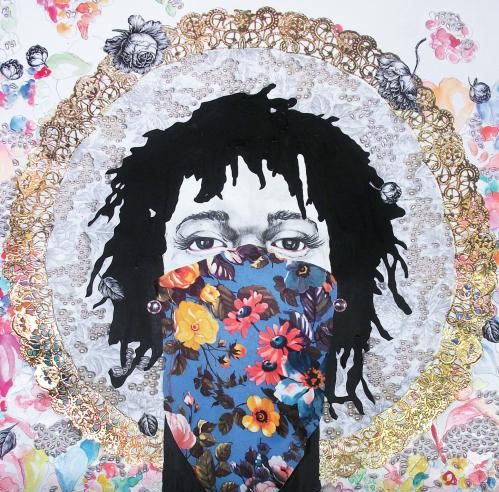By Elle Thompson, Staff Editor
On November 11, 2020, students gathered for one of the many teach-ins hosted by the Bryn Mawr strike collective, featuring four BIPOC alumni from Bryn Mawr and Haverford’s Creative Writing departments. The four alums—Juliana Feliciano Reyes, Michelle Zauner, Dennis Norris II, and Ian Pollock—discussed their experiences with both writing and activism at Bryn Mawr.
Both Bryn Mawr alums described positive experiences with the Creative Writing department. Michelle Zauner, a Bryn Mawr alumna who now performs under the stage name Japanese Breakfast, described feeling “very taken seriously” in her Creative Writing courses at Bryn Mawr. Juliana Feliciano Reyes, former features editor for The Bi-College News and now a reporter for The Philadelphia Inquirer, concurred, saying the Creative Writing program helped her build her confidence. “In the real world I doubted myself more, but at Bryn Mawr I didn’t second-guess myself as much,” said Reyes.
Dennis Norris II, an author and Haverford alum commented on the culture at their school. “Haverford at that time…really felt like a place where you could be creative and you should be creative, but it was second to academia,” they said. Norris had originally planned to be a Political Science major and only wanted to “dabble” in English; however, their dabbling eventually evolved into an English major late into their college career.
The four panelists pointed out a different approach to activism within their time.
“I never felt like there was an organized protest,” said Zauner. Reyes agreed, saying that during her time, “We didn’t talk about race.” Norris pointed out that after George Bush was re-elected in 2004, students wore all black the next day in mourning, but “we didn’t have social media in the way we do now. […] Facebook was a thing, but that’s it. News didn’t penetrate the Haverbubble in the same way it does currently.”
The panelists also discussed the ways in which Haverford had in some ways regressed. While Pollock felt that Haverford was a good community, he worried that “institutions become bigger than the people who are there.” He also discussed the importance of students going off-campus to protests. In his time at Haverford, people would go to Philadelphia and get arrested, and he felt that “Haverford had their back to some degree.” Wendy Raymond’s October 29th email, to the teach-in speakers, failed that mission. “The point is that Michael Brown was five years ago and Walter Wallace was now… students are putting themselves in danger, but… I think there should be room for that.” He also mentioned a former social justice class requirement at Haverford, which was eliminated in 2008.
The panelists also expressed how important it was to have professors in college who served as mentors for them. Norris pointed out that the people who took him most seriously and took their time to push him along were people of color. “That wasn’t lost on me,” he said.
The group also discussed their experiences with the majority-white culture at the college. “Sometimes people cover up not having anything to say with talking over people,” Pollock said on white feminist rhetoric. He cited experiences in Philadelphia, with both “the city and the people,” as an important part of connecting with the community. Reyes concurred, discussing her monthly participation in a queer Asian zine as a line of connection to the greater Philadelphia community. Norris emphasized the importance of stepping outside the Bi-College bubble. “If it’s too white at Bryn Mawr and/or Haverford, the first step is to look beyond these places. Because you’re going to have a whole life outside the Bi-Co.”
The speakers brought up the opposition they received concerning much of their work, something that did not end at graduation. Pollock stated that “I think I get pushback on writing about politics… [but] I’m going to stake my claim on ideas that are important to me. No matter what you write, you’re going to get pushback.” Reyes agreed, describing “censorship by norm,” or pushback on controversial ideas, within journalistic institutions like the Inquirer. Norris pointed out the presence of “gatekeepers” within the publishing industry, but also the ways in which those in power do not control everything, pointing out that “it only takes a couple of ‘yeses’ to get where you need to be.”
Pollock did advise, however, that in the activism world as a whole, it was important to “be careful of burnout,” emphasizing the need for keeping up continuous work. On this topic, he complimented the Bryn Mawr strike, lauding its effort towards “building structure”: “when you’re gone, people will benefit.”
When asked about college regrets, Norris and Reyes both pointed to a lack of exploration of queerness within the community, with Norris explaining that they didn’t know “what I really needed as a queer person” and lacked community support at Haverford. Pollock emphasized his pride in the activism occurring at Bryn Mawr and Haverford. “I wish I had spoken out more… that’s why I’m so proud of what’s happening on campus. Folks are doing things I wish I had done.”
In the aftermath of the twin strikes, we, too, should reflect on what we have done on this campus, and what we can continue to do. As to what we should do now: From Norris, let yourself dream. From Pollock, there’s a budget for your dreams. And from Reyes, never accept the first offer.
Image credit: American Short Fiction, Volume 23 Issue 72 Winter 2020 cover art
